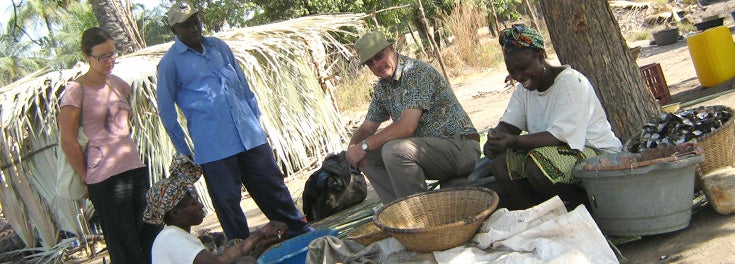
You’ll be inspired by what the URI Coastal Resources Center and a determined community of women in a far-away nation have done in just a few years.
Not long ago in The Gambia, a small group of very poor and poorly educated, middle-aged, single mothers eked out a living- harvesting oysters from the Tanbi Wetlands. It was dangerous, hard work with low economic return. And, oyster supplies were being rapidly depleted. They did this work to feed themselves and their families, and because it was the only job left for the country’s most devalued.
The beauty of the Sustainable Fisheries Management Project lies in the fact it is while helping preserve coastal ecosystems, it is also transforming lives—giving these marginalized women hope for their future and the future of their children.
Today, the women still harvest oysters. But much has changed thanks to a forward-thinking Gambian woman named Fatou Janha Mboob, and the work of URI’s Coastal Resources Center. Mboob inspired 500 oyster harvesters from 15 disconnected communities to form the TRY Oyster Women’s Association. Then she tapped our Coastal Resources Center to use part of a $3.4 million, five-year grant from USAID to train these women in harvesting, marketing, and business practices and to help them gain governmental recognition and policy supporting and managing the oyster fishery. The program, called the Sustainable Fisheries Management Project, is a partnership of URI with global and Gambian agencies. Our coastal managers travel to The Gambia to teach, train and guide the women and the government in building an oyster fishery that will last for generations to come. The beauty of the program lies in the fact it is while helping preserve coastal ecosystems, it is also transforming lives—giving these marginalized women hope for their future and the future of their children.
The women are reaping economic benefits they never imagined. Through our training they’ve learned to use a shorter harvesting season, giving oysters time to reproduce, grow larger, and draw higher selling prices. They’ve learned to preserve oysters to sell during the off-season to keep income flowing. They now use harvesting tools that protect the mangrove roots on which the oysters grow and to continue planting mangrove seedlings to keep the oysters’ habitat productive. We have also taught them basic financial and small-business management, and now, for the first time in their lives, the women have a mindset for turning profits into savings.
In The Gambia and beyond, the TRY women are moving from “marginalized” to “recognized.” The government granted them decision-making powers and exclusive rights to harvest oysters in the Tanbi Wetlands—making them possibly the first African women granted such authority. Their work earned the United Nations 2012 Equator Prize for community-based conservation and management of the Tanbi Wetland Reserve. They were recently featured on Gambian and BBC radio, and drew more than 250 community members and government leaders to their third annual Oyster Festival fundraising event. And, in a nation where K-12 education is not free, the Minister of Basic Education committed 17 scholarships so children of the TRY women can attend school.
Organizing has brought other benefits too—access to boots, boats, life jackets and other tools to reduce work hazards. The women even have uniforms and gloves that set them and their higher-quality product apart from market competitors.
We are teaching the women and government the role of water quality in the health of the oysters. TRY now plans to build a processing facility to improve industry hygiene and thereby strengthen the commercial market value for oysters throughout the nation, and possibly beyond.
When forming TRY, founder Mboob wisely knew one “collective voice” would be stronger than many individual voices. And the URI-Coastal Resources Center is proudly sharing the information, tools, and skills that are helping give that collective voice the knowledge and confidence it needs to change lives.
Related Links:
